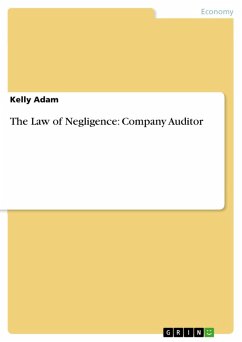Document from the year 2013 in the subject Business economics - Revision, Auditing, , language: English, abstract: Auditors accumulate and evaluate information to be able to determine whether the financial reports of a given company complied with legislative requirements and established criteria. An auditor therefore determines the credibility of financial information so that the correct use of it in business and investment decisions can be made. Auditors have legal duties attached to their activities which they are expected to uphold. A breach of the legal duty which is imposed and fixed by law due to careless acts constitutes what is termed as negligence. This makes it to be based on conduct rather than any form of agreement. A tort of negligence therefore is only committed when actionable damage is sustained, and this is not only by carelessness but by inflicting damage carelessly in situations where the law recognizes a duty to be careful. Negligence is hence established if the conduct was careless and there existed a causal relationship between the damage and that conduct. A close look at it is a situation where the conduct was foreseeable to inflict the damage on person harmed. Negligence statements provided by company auditors can result to pure economic loss. Internal auditors check the accuracy of the financial information and provide an opinion whether the information is true and fair according to the accounting standards and common law. They are liable to external users of financial information since external users rely on audited statements to make investment decisions hence the need of the opinions to be unbiased and remain independent. Therefore, it is their legal duty to provide an assurance to all audited statements users that the material is not of fraud, its reliable and lacks irregularities. Conclusion by the auditor that the information is fairly stated as per the accounting standards makes them liable if they are found to have been materially misstated.
Dieser Download kann aus rechtlichen Gründen nur mit Rechnungsadresse in A, B, BG, CY, CZ, D, DK, EW, E, FIN, F, GR, HR, H, IRL, I, LT, L, LR, M, NL, PL, P, R, S, SLO, SK ausgeliefert werden.









